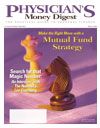Publication
Article
Physician's Money Digest
Always Keep an Eye on Our Mutual Friends
Author(s):
Way back in the 1920s, someonefigured out that agroup of small investorscould be pooled to hire an advisor toknowledgeably manage their stocksfull time. And thus an industry wasborn—the mutual fund industry.These funds have proven so popularthat they have proliferated to actuallyoutnumber the individual stocksavailable to be analyzed and owned.And every portfolio combinationimaginable is available: large companies,small companies, foreign companies,and sector companies like oil orretail. You get the idea.
Because there is such a confusingwelter of voices clamoring for yourattention with wild claims of highreturns, another whole industry hassprung up: advisors in print and in personwho do nothing but sort throughthe possibilities of mutual funds tohelp individuals make appropriatechoices. That is what this month's featureis all about.
And as with all things financial,there are the usual caveats, such as thefact that in any given year 75% ofthese funds do not even make variousmarket averages. The mutual fundsthat do better than the Dow, S&P500, and so on almost always cannotsustain that record of success formore than a few years. They alwayssay, "Past performance cannot be aguarantee of future results." But theevidence is that many of us have thatold herd mentality and chase past performanceby buying last year's winnerseven if we know better.
So why don't we just stick with theso-called index and exchange-tradedfunds? Many of us should. It's easy,you don't have to worry about who isactually doing the stock analyzingand picking because there isn't anyone.It's a basket of all the companiesin that particular index. For youdoubters, it's been proven time andagain that the market as a whole outperformsindividuals over the longrun. And there isn't the usual mutualfund 100% annual turnover of stockcontents with their attendant hightransaction costs. Indexes have abouta 0.3% annual cost vs 1.36% formutual funds. But don't kid yourself.If you do the math, over your investinglifetime, transaction costs add upto be a huge, silent difference in howmuch you end up with for collegetuition or for your retirement.
I recently stepped into these deepwaters with my financial advisor andcame to these same grudging conclusions.It isn't glamorous, and you giveup the faint hope of the big score, butat the end of the day, a diversifiedbasket of index funds will not onlyallow you to sleep better, but win theday over performance-chasing mutualfunds. Read on, see what you think,and let me know.
